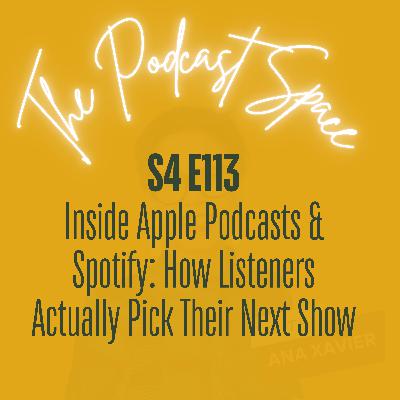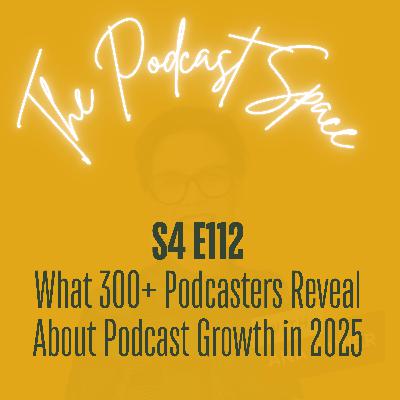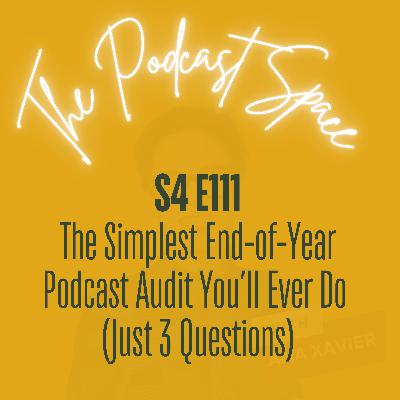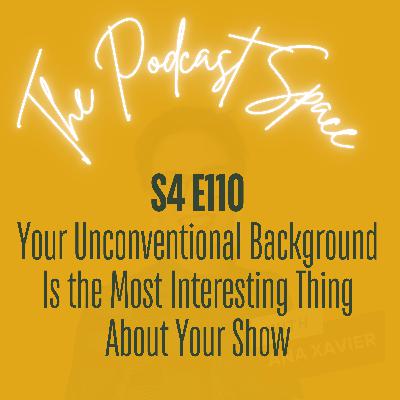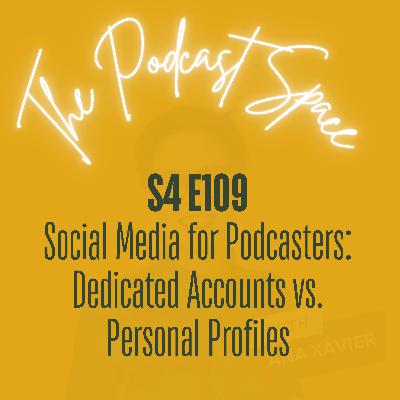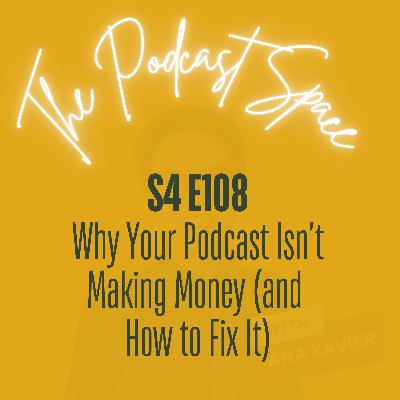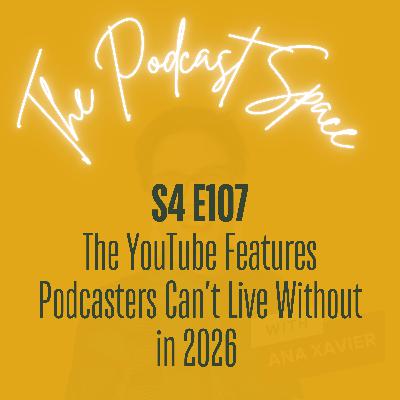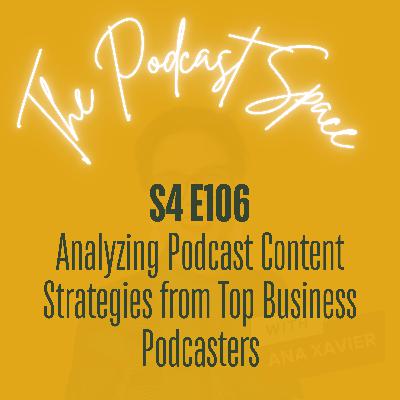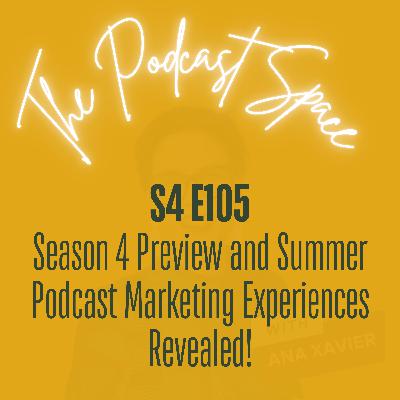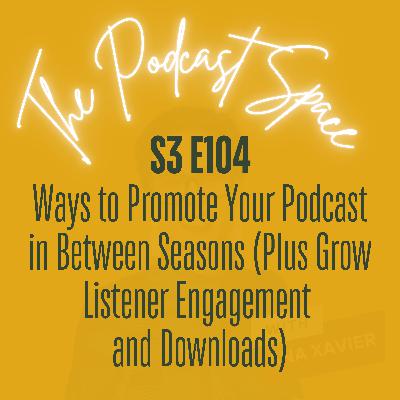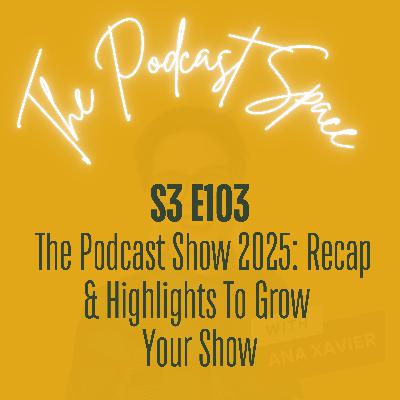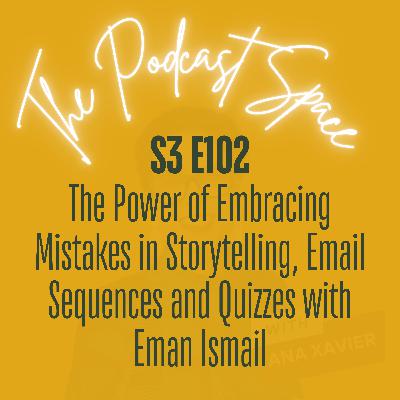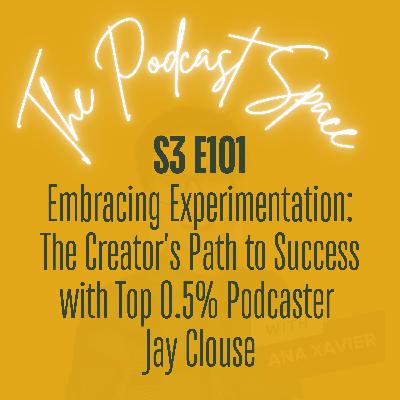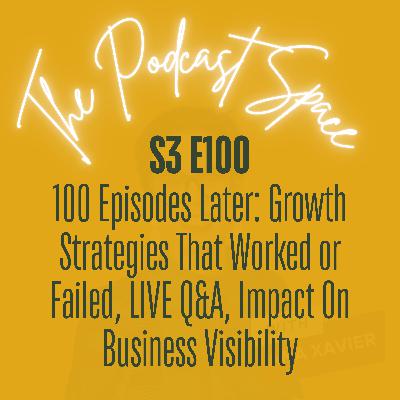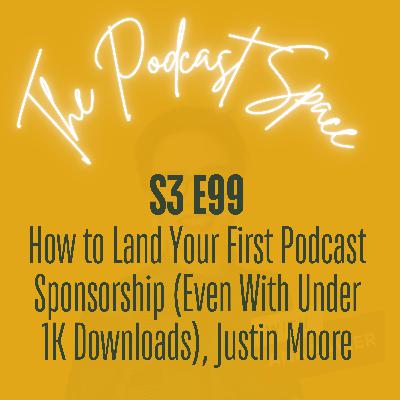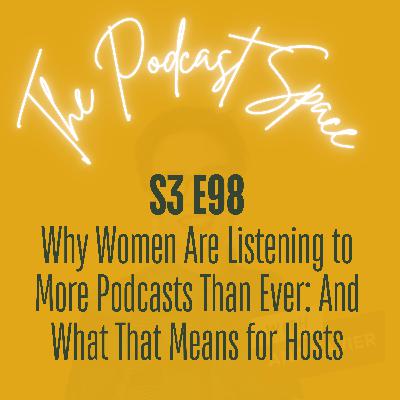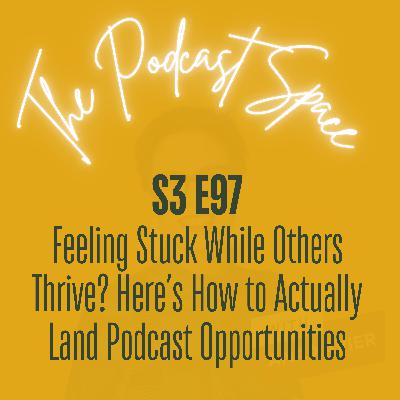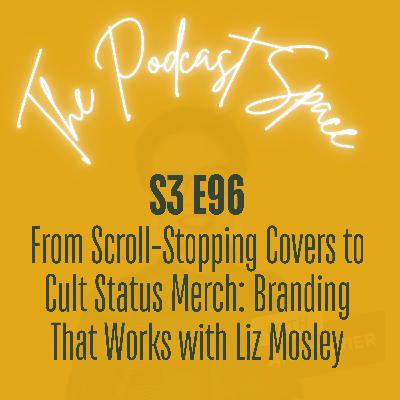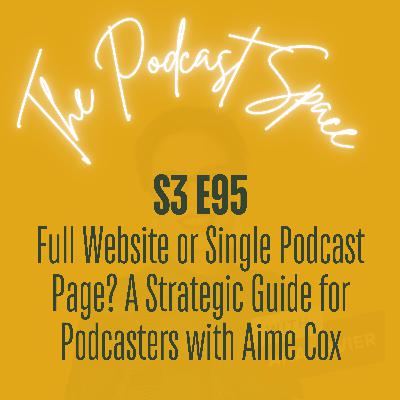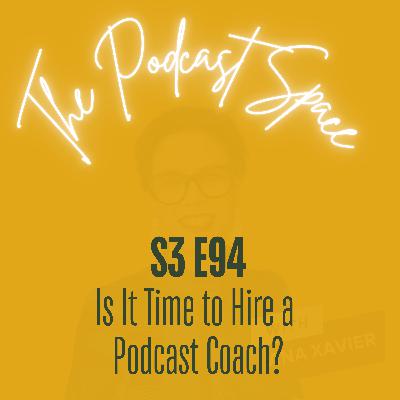Discover The Podcast Space
The Podcast Space

The Podcast Space
Author: The Podcast Space, Ana Xavier
Subscribed: 2Played: 12Subscribe
Share
© Copyright 2025 The Podcast Space, Ana Xavier
Description
Tired of vague podcasting advice that doesn’t move the needle? The Podcast Space delivers real-world, practical strategies to help impact-driven women, multilingual creators, and underrepresented podcasters grow with confidence.
Hosted by Ana Xavier—an award-winning podcast marketer and strategist with clients across the globe, and 15+ years of experience in the industry—this show offers bite-sized, tactical advice you can implement right away.
From content workflows to repurposing, SEO, podcast marketing, and visibility strategies, every episode focuses on simplifying your podcast process while helping you build long-term authority. If you're ready to stop spinning your wheels and start using your podcast like the marketing tool it is, you’re in the right place.
https://thepodcastspace.com/podcast
This podcast uses the following third-party services for analysis:
Podtrac - https://analytics.podtrac.com/privacy-policy-gdrp
Hosted by Ana Xavier—an award-winning podcast marketer and strategist with clients across the globe, and 15+ years of experience in the industry—this show offers bite-sized, tactical advice you can implement right away.
From content workflows to repurposing, SEO, podcast marketing, and visibility strategies, every episode focuses on simplifying your podcast process while helping you build long-term authority. If you're ready to stop spinning your wheels and start using your podcast like the marketing tool it is, you’re in the right place.
https://thepodcastspace.com/podcast
This podcast uses the following third-party services for analysis:
Podtrac - https://analytics.podtrac.com/privacy-policy-gdrp
114 Episodes
Reverse
Most podcasters assume discovery happens through social media, word of mouth, or being featured by the editorial teams at Apple Podcasts or Spotify. But the data tells a very different story. In this episode, I sit down with Jennifer Han, CMO at Ausha, to unpack how listeners actually choose their next podcast, and why most creators are optimizing for the wrong behaviors.What surprised even me is how dominant in-app search has become. According to the industry discovery research we discuss, one in two podcast listeners discover new shows directly inside podcast apps, and 70% of them use the search bar. Editorial features and charts? They account for a fraction of discovery. If you want to grow sustainably, understanding how Apple Podcasts and Spotify search really work it’s truly foundational to surpass your competitors.Resources mentioned in this episode:For the full list of links, resources and show notes, please visit:https://thepodcastspace.com/podcast/s4-113-pso-and-ranking-on-podcast-platformsTry PSO [affiliate link]: https://ausha.co/?fpr=psothepodcastspace👩💻 Book your Podcast Power Hour: thepodcastspace.com/powerhourChapters:00:46 - Meet Jennifer Han: Chief Marketing Officer for Ausha01:33 - Understanding Podcast Search Optimization06:45 - Practical Tips for Podcast Metadata15:05 - Optimizing for Apple Podcasts and Spotify23:07 - Tracking and Analyzing Podcast Performance28:13 - Conclusion and Additional ResourcesThis podcast uses the following third-party services for analysis: Podtrac - https://analytics.podtrac.com/privacy-policy-gdrp
If you ask most podcasters what they’re doing to grow their show, the answers sound familiar: posting clips on social media, chasing consistency, experimenting with video, and hoping the algorithm finally notices them. But when you look at the data - real, self-reported data from creators who’ve been at this for years - a different story emerges. Growth isn’t evenly distributed, and effort doesn’t automatically translate into momentum. Some podcasts with massive audiences are shrinking, while smaller, focused shows are quietly compounding month over month. The gap isn’t about talent or effort but it’s truly about strategy.That’s why my conversation with Jeremy Enns stopped me in my tracks. As the researcher behind the Podcast Marketing Trends Report, Jeremy looks past tactics and into patterns. What stood out most wasn’t what podcasters should be doing, but what actually correlates with sustainable growth and what doesn’t. Even more striking: his personal recommendation for podcasters who want to grow without ever touching social media. Not as a contrarian take, but as a data-informed one.Chapters:03:10 – Who took the Podcast Marketing Trends Report 2005 05:30 – Why Big Podcasts Are Shrinking While Small Shows Grow07:20 – You Don’t Need a Large Audience to Build a Profitable Podcast09:55 – The Reality Behind Declining Podcast Growth Rates12:45 – Audio vs. Video: How Metrics Are Being Distorted16:50 – Do Social Platforms Actually Drive Podcast Growth?20:00 – Short-Form Video Builds Brands, Not Downloads28:40 – Why Email Is the Most Underrated Growth Channel37:05 – How to Grow a Podcast Without Social MediaResources mentioned in this episode:For the full list of links, resources and show notes, please visit:https://www.thepodcastspace.com/podcast/s4-112-what-300-podcasters-reveal-about-podcast-growth-in-2025-podcast-marketing-trends-report👩💻 Book your Podcast Power Hour: thepodcastspace.com/powerhourCheck out the Podcast Marketing Trends Report.This podcast uses the following third-party services for analysis: Podtrac - https://analytics.podtrac.com/privacy-policy-gdrp
Reflecting on the annual impact of your podcast can often feel like never-ending numbers and charts, trends, and internet buzz. Downloads, comments, views - it's easy to get overwhelmed by the metrics that are supposed to define your success. What if I told you that you could bypass this chaos by focusing on just three crucial questions to audit your podcast effectively and strategically?In my 15+ years of working as a podcast marketer and content strategist, I've seen creators get analysis paralysis over podcast analytics, forgetting the core reasons they started in the first place. My goal with this episode is to help you reclaim clarity and purpose for your podcast with a simple, focused audit before the end of the year. Ready? Just hit play.📝 Reflect back on these three vital questions: Did your audience grow meaningfully? Did the podcast align with your larger business goals? Were your processes conducive to effortless and effective content creation? By keeping a pulse on these areas, you're equipped to go into the new year with a renewed focus and determination. For more focused guidance, book a discovery call to plan a content strategy that suits your goals and minimizes the overwhelming noise. Chapters:00:00 Introduction to the Simplest Podcast Audit You'll Ever Make00:12 The Importance of Strategic Podcast Audits00:37 Equipping Yourself for Podcast Success02:23 Understanding Podcast Metrics06:16 Evaluating Podcast Impact on Goals13:17 Tools and Processes for Podcast Efficiency24:00 Final Thoughts and InvitationResources mentioned in this episode:For the full list of links, resources, and show notes, please visit:https://www.thepodcastspace.com/podcast/s4-111-the-simplest-end-of-year-podcast-audit-youll-ever-do-just-3-questions👩💻 Book your Podcast Power Hour: thepodcastspace.com/powerhourThis podcast uses the following third-party services for analysis: Podtrac - https://analytics.podtrac.com/privacy-policy-gdrp
If having a small audience is the number one insecurity podcasters face, the second biggest is this one: “My background isn’t traditional enough… so who am I to host a podcast?” Maybe you’ve wondered the same. Maybe you’ve questioned whether your experience “counts,” or whether you’re allowed to call yourself an expert.Here’s the truth — the podcasters who stand out aren’t the ones with the most formal credentials. They’re the ones who understand how their lived experiences, soft skills, and natural strengths help them connect with listeners in a way no traditional path ever could. And in this episode, I’ll show you exactly how to tap into that.You don’t need decades of experience or a perfect résumé to have a meaningful presence behind the mic. Listeners connect to shows that feel human — and humanity comes from perspective, not perfection. When you really think about the shows you love, it’s rarely about textbook expertise. It’s about how the host makes you feel understood.Your past roles (even the unexpected ones) have given you tools you might not realize you have. Retail jobs? They train you to read emotions, understand insecurities, and create comfort — all skills that help you put guests at ease and show up confidently on camera or audio. Hospitality teaches you to anticipate needs, calm nerves, and guide people through new experiences. If you’ve ever worked a service job, you’re already equipped to create a welcoming recording environment and a listener experience that feels intentional. Maybe you’ve had communications, journalism, or content roles. Those experiences help you sharpen your hooks, verify information, tell stronger stories, and structure episodes that actually fulfill the promise of the title. These are transferable skills — not prerequisites you need to “earn.” If you've worked in nonprofit or mission-driven spaces, you already understand how to do a lot with limited resources. That ability to be scrappy, collaborative, and strategic is gold when building a sustainable podcasting workflow. Your personal passions matter, too. Your interest in design, aesthetics, or visual storytelling? That’s exactly what helps you create a coherent brand and a recording setup that communicates trust and personality before you say a single word. If you geek out on psychology or human behavior, that becomes the backbone of your listener journey — guiding people from “I found this episode interesting” to “I want to learn more,” and eventually “I want to work with this host.” And when you look at other podcasters with non-traditional backgrounds — like Hetal, who used her curiosity as a biomedical engineer to break down global health topics, or Dani (Danilea), who built a wellness show rooted in inclusivity — you’ll see proof that you don’t need the “right background.” You need the right angle. Your life, your perspective, your interests, and even your quirks make your show memorable. These elements shape your show’s promise and help listeners feel like they’re learning from someone who gets them — not someone performing expertise.As AI-generated content becomes more common, the shows that win will be the ones rooted in lived experience, real stories, and genuine connection. Everything that makes you “different” is exactly what helps you stand out.Chapters:00:00 - Overcoming Podcasting Insecurities 07:06 - The Importance of Hospitality Skills in Podcasting 13:42 - Marketing Strategies for Podcasters 18:57 - Connecting Personal Interests to Podcasting 24:08 - Final Thoughts on Unique Show PremisesResources mentioned in this episode:For the full list of links, resources and show notes, please visit:a...
Are you torn between creating a dedicated social media account for your podcast or integrating it into your personal brand? You're not alone! In this episode of The Podcast Space, we’ll break down the critical decision many podcasters face regarding social media as a podcaster. With my extensive experience in podcast marketing, I’ll guide you through the nuances of this dilemma that keeps so many podcasters paralyzed and help you find the best path forward for your unique situation. As an award-winning podcast marketer, I’ve worked with podcasters and small business owners around the globe, and I’ve seen firsthand how your approach to social media can significantly impact your podcast's success. I emphasize that the choice between a dedicated account and your personal brand hinges on several factors: your personal goals, the resources at your disposal, and how you want to engage with your audience. Understanding these elements is essential for crafting effective podcasting strategies and achieving your podcasting goals. Throughout the episode, I'll present five critical questions that every podcaster should consider when deciding their social media strategy: What is the main goal of your account? How many platforms can you realistically manage? Are you ready to develop a comprehensive strategy? Do you want to go beyond the bare minimum? And how can your listeners publicly share and discuss your show? These questions are pivotal in shaping your podcast content strategy and ensuring that your social media efforts align with your overall podcast growth strategies. I also explore the pros and cons of both approaches. A personal account can be a powerful tool for those looking to build their personal brand, while a dedicated account can offer a clearer focus and more targeted marketing opportunities. Throughout this episode, I share tactical podcast advice and podcast marketing tips to help you make an informed decision that aligns with your vision. Ultimately, my goal is to encourage you to be intentional in your social media strategy for your podcast. By doing so, you can forge meaningful connections with your audience, enhance your podcast visibility, and increase listener engagement. Join me in this episode, as we navigate the world of social media for podcasters and equip you with the insights needed to avoid common podcasting mistakes and leverage your online presence effectively. Chapters:00:00 -Introduction to Social Media Strategies for Podcasters01:01 - Key Questions to Determine Your Social Media Strategy05:40 - When to Use Personal Accounts for Podcast Promotion09:53 - When to Create a Dedicated Podcast Account16:24 - Common Mistakes Podcasters Make on Social Media23:20 - Conclusion and Call to ActionResources mentioned in this episode:For the full list of links, resources and show notes, please visit:https://www.thepodcastspace.com/podcast/s4-109-social-media-for-podcasters-dedicated-accounts-vs-personal-profiles-for-maximum-engagement-and-growth-strategies👩💻 Book your Podcast Power Hour: thepodcastspace.com/powerhourTags: social media for podcasters, podcasting strategies, podcast marketing, social media strategies for podcasters, podcast growth strategies, podcasting for personal brand, social media, listener engagement strategies, podcast visibilityThis podcast uses the following third-party services for analysis: Podtrac -...
For years, business owners have been told that starting a podcast is the ultimate marketing move — the one strategy that magically solves everything. And while I genuinely believe podcasts are among the most powerful visibility tools available, I’ve also seen how they can become a money-draining hobby instead of a high-ROI business asset.After working with podcasters across four continents, I’ve realized that many are unknowingly leaving money on the table — not because their show isn’t great, but because their monetization strategy isn’t aligned with their business model. Let’s break down the five biggest ROI mistakes that could be quietly costing you growth and revenue.Chapters:00:00 - The Power of Podcasts in Business00:53 - Common Mistakes in Podcast Monetization02:11 - Exclusive Deals vs. Broad Reach05:07 - The Importance of Product Promotion08:48 - Ad Breaks: A Missed Opportunity13:42 - Selling Without Being Salesy17:17 - The Fallacy of Affiliate Marketing1. Exclusive Distribution Without a Data-Backed ReturnMany business owners see creators landing “exclusive” deals with Spotify or Samsung and think that’s the ultimate success metric. But here’s the reality — exclusivity limits your reach unless the platform can prove it will drive revenue or audience growth. Unless they can show data, testimonials, or client case studies that back up the ROI, you’re better off being everywhere (including YouTube)!2. Misalignment Between What You Sell and What You SayThis is one of the most expensive mistakes I see. Too many podcasters are producing content their ideal clients don’t actually need. If your episodes aren’t directly connected to the problems your business solves, you’re building awareness with the wrong audience.3. Skipping Ad Breaks (and Missing Sponsorship Readiness)Here’s a simple test: can someone listen to your show and instantly visualize where their ad could go? If not, you’re missing out. Even if you’re not running ads yet, including clear ad breaks (“We’ll be right back after this quick message…”) signals to brands that you understand structure.4. Educating Endlessly — and Forgetting to SellA lot of purpose-driven creators fear that selling will make them sound pushy. But education without goal connection will lead to creator burnout. Today’s content landscape is noisy, and subtlety doesn’t pay the bills.5. Prioritizing Affiliate Links Over Your Own ProductsAffiliate links can be tempting, but they rarely create meaningful income for small, niche shows. Let’s do the math: promoting a $30/month tool with a 10% commission might earn you $3. Promoting your own $500 coaching session or $95 digital product could earn you hundreds or thousands.The Real ROI Shift: Treating Your Podcast Like a Business ToolWhen you start structuring your podcast like a revenue engine — not a random content platform — everything changes. You create episodes intentionally. You align your call-to-actions. You attract sponsors who share your values. And suddenly, your show isn’t an expense — it’s an asset.Podcasting is still one of the most effective visibility tools for service-based business owners. The difference between a show that drains your energy and one that drives consistent ROI is strategy.Resources mentioned in this episode:For the full list of links, resources and show notes, please visit:https://www.thepodcastspace.com/podcast/s4-108-how-to-turn-your-podcast-from-a-time-sink-into-a-sales-engine👩💻 Book your Podcast Power Hour:
If you’re serious about growing your podcast in 2026, YouTube is no longer a “nice to have”—it’s a core part of your podcast marketing strategy. This year, YouTube rolled out a wave of new tools that make the platform friendlier than ever to creators who want to grow sustainably without burnout. From AI-powered analytics to auto-dubbing in 20+ languages, these updates are transforming how podcasters reach global audiences, collaborate smarter, and monetize content more effectively.But here’s the real question: which of these features actually move the needle for podcasters—and which are just shiny distractions? In this episode of The Podcast Space, I welcome video strategist Yesenia Bocanegra to break down what’s essential for growth, what to experiment with, and what you can safely ignore (at least for now).The Must-Try Features for Podcasters on YouTubeThe new AI analytics in YouTube Studio are one of my favorite additions. They make it so much easier to understand how each episode performs, which content connects most with listeners, and where new subscribers are coming from. I’ve always loved data, but let’s be honest—it can be overwhelming. This update finally makes analytics feel approachable, even for creators who aren’t data nerds.Then there’s the collaboration feature, which has been an absolute game changer for me. I tested it by tagging past guests in older videos, and after collaborating with sponsorship coach Justin Moore, I saw a 700% increase in views in just two weeks. It’s one of those “low effort, high reward” features that breathe new life into your back catalog. I now see collaborations as part of my passive marketing strategy—a simple but powerful way to extend reach without constantly creating new content.Chapters:00:00 - Introduction to YouTube's New Features for Podcasters00:07- Leveraging YouTube’s New Collaborations Tool for Audience Growth00:38 - AI Tools and Studio Upgrades for Content CreationResources mentioned in this episode:For the full list of links, resources and show notes, please visit:https://www.thepodcastspace.com/podcast/s4-107-the-youtube-features-podcasters-cant-live-without-in-2026-and-whats-just-hype👩💻 Book your Podcast Power Hour: thepodcastspace.com/powerhourThis podcast uses the following third-party services for analysis: Podtrac - https://analytics.podtrac.com/privacy-policy-gdrp
Ever wondered what are successful business owners who podcast doing in 2025 that regular podcasters can replicate? The answer lies in how these entrepreneurs treat their shows as part of a larger, data-informed ecosystem—not just as a content stream. This year, podcasting for business growth is about alignment, experimentation, and audience intimacy.To find out what’s actually working, I analyzed two powerhouse podcasters—Jasmine Star and Chris Do—both of whom have a catalog of over 300 episodes, and built thriving businesses before launching their shows. Their podcasts don’t make their brands; they amplify them. Here’s what 2025’s most strategic business podcasters are doing differently—and how you can borrow their best moves.Chapters:00:00 Introduction to Podcasting Strategies from Successful Business Owners12:49 Analyzing Episode Formats and Best Practices used by Jasmine Star21:47 Maximizing Show Notes and SEO27:44 Podcast Structure and Episode Formats used by Chris Do40:14 Treating Your Podcast Like a BusinessResources mentioned in this episode:For the full list of links, resources and show notes, please visit:https://www.thepodcastspace.com/podcast/s4-106-analyzing-podcast-content-strategies-from-top-business-podcasters👩💻 Book your Podcast Power Hour: thepodcastspace.com/powerhourThis podcast uses the following third-party services for analysis: Podtrac - https://analytics.podtrac.com/privacy-policy-gdrp
Welcome to a brand-new season of The Podcast Space! In this episode, I’m pulling back the curtain on:What you can expect from Season 4 — topics, formats, and epic guestsThe behind-the-scenes of my summer growth experimentsWhat worked, what didn’t, and how you can apply these lessons to your own showIf you’ve ever wondered how to keep momentum during a podcast break or how to adapt your content strategy in a fast-changing online world, this episode will give you both the inspiration and the data to take action.What’s coming in Season 4This season, I’ll be mixing solo episodes with a few interviews to give you a broader podcasting perspective. Our two core content pillars are content strategy and marketing, so you can expect episodes on monetization, avoiding ROI mistakes, how to make the most of YouTube’s new features, and creative formats that fit busy entrepreneurs.I’m also thrilled to welcome dream guest Denise Duffield-Thomas, a money mindset coach whose show has been one of my personal favorites for years. It’s a reminder that persistence pays off — this was my third pitch to her team, and it worked. If you’ve been hesitating to reach out to your own dream guests, let this be encouragement not to give up.Chapters:00:01:00 — Content pillars + what’s new this season00:04:00 — Dream guest announcement (and reminder not to give up pitching!)00:06:00 — New formats, tools, and industry shifts to watch00:08:00 — Growth experiments recap: newsletter, YouTube, guesting, and more00:14:00 — SEO shifts, AI tools, and website optimization00:16:00 — Lessons from Podcast Movement & multilingual strategies00:18:00 — Writing a book? Early market research insights00:19:30 — Why flexibility is key to podcast growth in 202500:20:00 — Wrap-up and call to actionResources mentioned in this episode:For the full list of links, resources and show notes, please visit:https://www.thepodcastspace.com/podcast/s4-105-season-4-preview-and-summer-podcast-marketing-experiences-revealedSubscribe to the Podcast on Audio Platforms: https://bit.ly/3Y4bF2c Subscribe to our newsletter for more Podcast Tips: https://thepodcastspace.ck.page/32680fa82e 💸 Affiliate links:Captivate.fm (Best Podcast Hosting platform)- https://www.captivate.fm/signup?ref=thepodcastspaceRiverside.fm (Record high-quality interviews)- https://bit.ly/46C7A9EDescript (Edit a podcast as easily as a word doc) - https://get.descript.com/tpm8vv079uxfCustom Neon (Neon sign) - 10% OFF a...
How do you promote your podcast in between seasons? For many podcasters, that question can feel overwhelming — so they end up doing nothing. But going dark between seasons doesn’t mean your show has to lose momentum. In fact, it's a missed opportunity if you're not keeping your audience engaged and attracting new listeners during the downtime.In this episode, I’ll walk you through specific strategies to market your podcast even when you're not actively releasing new content. We'll cover social media, email newsletters, and less-talked-about tactics that balance high and low effort, so you can stay visible without burning out.Before promoting in between seasons, ask yourself ‘why’Let’s start with the “why.” Promoting your podcast between seasons is key if you want to maintain listener engagement, attract new audiences, and keep your show top of mind. People forget content fast, and even your best episodes get buried in the feed. Resurfacing those episodes gives them new life — especially for new followers who haven’t heard them yet.One misconception I hear often is, “If I stop publishing, I’ll lose my audience forever.” That’s partly true — people fill their routines with other content, and if you’re absent, they’ll move on. But here’s the fix: give them a place to stay connected. Use your email list or social media to let them know when you’ll be back. Communicate. Create reminders. Set expectations.Chapters:00:00:00 – Why your show still needs visibility even when you're not publishing new episodes00:01:30 – How audience habits and memory impact re-engagement — and why reminders matter00:02:30 – Before you market: define whether you're building visibility, growing your email list, or prepping for a launch00:03:30 – What really happens when you stop publishing — and how to avoid losing your audience00:05:00 – How to repurpose past episodes with new context, visuals, and formats00:07:00 –Forgot to mention something in an episode? Here's how to update and reshare it effectively00:08:00 – Engaging your audience with live Q&As, former guests, and timely follow-ups00:09:00 – Themed email sequences, updated visuals, and related episode links to keep listeners coming back00:10:30 – Why your website and YouTube presence matter — and how they help grow your audience off social media00:12:30 – Newsletter swaps, RSS digests, and why repurposing content is better than starting from scratchResources mentioned in this episode:Get your Newsletter Guide: https://www.thepodcastspace.com/newsletterFor the full list of links, resources and show notes, please visit:https://www.thepodcastspace.com/podcast/s3-104-ways-to-promote-your-podcast-in-between-seasons-plus-grow-listener-engagement-and-downloads👩💻 Book your Podcast Power Hour: thepodcastspace.com/powerhourSubscribe to the Podcast on Audio Platforms: https://bit.ly/3Y4bF2c Subscribe to our newsletter for more Podcast Tips: a...
If you're serious about podcasting in 2025, you need to know what’s coming — and what’s already changing. Whether you're trying to grow your audience, stay visible without burning out on social media, or figure out if you really need to start filming your episodes, this episode is packed with exactly the kind of insights that can help you make smarter moves. Think of it like your shortcut to understanding what the industry’s top platforms, creators, and marketers are buzzing about right now.The Podcast Show in London brought together over 6,000 creators and industry leaders from around the world, and the biggest themes were clear: video podcasting, YouTube strategy, smart AI tools, and new ways to grow without relying on downloads or going viral. In this episode, I’m breaking it all down for you — the trends, the tools, and most importantly, how to apply it all to your podcast, whether you’re just starting out or already in deep.Chapters:00:01:30 – Embracing authenticity and longevity in podcasting, even when episodes aren’t perfect00:03:00 – Key takeaways from YouTube’s session at The Podcast Show00:03:30 – Stats reveal that more UK listeners are consuming podcasts on YouTube from their smart TVs00:04:00 – UK listener data that shows mixed podcast listener preferences00:05:00 – YouTube and AI innovations may soon help podcasters reach multilingual audiences 00:06:00 – Choosing hosting your podcast on RSS vs. YouTube00:07:00 – Best practices for using AI to enhance productivity without losing creative or strategic control00:08:30 – Industry leaders push for more accurate podcast growth metrics to reflect modern listening habits00:09:30 – A creator who sold two podcasts, and what those figures were00:10:00 – Email marketing, newsletters, podcast swaps as ways to grow a podcastResources mentioned in this episode:GET YOUR GUIDE: https://www.thepodcastspace.com/newsletterFor the full list of links, resources and show notes, please visit:https://www.thepodcastspace.com/podcast/s3-103-the-podcast-show-2025-recap-highlights-to-grow-your-show👩💻 Book your Podcast Power Hour: thepodcastspace.com/powerhourSubscribe to the Podcast on Audio Platforms: https://bit.ly/3Y4bF2c Subscribe to our newsletter for more Podcast Tips: https://thepodcastspace.ck.page/32680fa82e 💸 Affiliate links:Captivate.fm (Best Podcast Hosting platform)- https://www.captivate.fm/signup?ref=thepodcastspaceRiverside.fm (Record high-quality interviews)- https://bit.ly/46C7A9EDescript (Edit a podcast as easily as a word doc) -
As a podcaster, crafting narratives in the public eye means making mistakes along the way is inevitable. But I've started to wonder—what if those very mistakes could be the secret sauce to creating relatable, engaging, and transformative storytelling? Alongside Eman Ismael, host of the multi-award-winning podcast Mistakes that made me, we explored the importance of embracing the notion of learning from failure to build authenticity and connection with audiences worldwide in public, exemplified perfectly by Monica Lewinsky’s newest podcast, Reclaiming with Monica Lewinsky. Chapters:00:00 Introduction to Embracing Mistakes in Podcasting00:17 Meet Eman Ismail: Multi-Award Winning Podcast Host02:06 The Power of Vulnerability and Overcoming Shame07:07 Cultural Differences in Business Openness14:58 The Importance of Email Marketing for Podcasters26:19 Behind the Scenes: Voice Care and Content Creation29:01 Dealing with Intellectual Property Theft29:45 Overcoming Challenges as a Podcaster32:45 The Importance of Authenticity and Openness as Creators39:56 Navigating Revenue Transparency47:29 Effective Email Marketing Strategies50:46 Creating Engaging Quizzes for Your Audience58:16 Conclusion and Final ThoughtsEman and I also explored what type of email marketing podcasters can use to grow more intentionally, her online quiz, and the emotional toll of having her copy stolen.Resources mentioned in this episode:For the full list of links, resources and show notes, please visit:https://www.thepodcastspace.com/podcast/s3-102-the-power-of-embracing-mistakes-in-storytelling-email-sequences-and-quizzes-with-eman-ismailLearn more about Eman Ismail and her award-winning podcast Mistakes That Made Me: https://www.emancopyco.com/podcastTake Eman’s quiz ‘What’s Your Perfect Newsletter Style?’: https://www.emancopyco.com/quizConnect to Eman on Instagram: https://www.instagram.com/emancopyco👩💻 Book your Podcast Power Hour: thepodcastspace.com/powerhourSubscribe to the Podcast on Audio Platforms: https://bit.ly/3Y4bF2c Subscribe to our newsletter for more Podcast Tips: https://thepodcastspace.ck.page/32680fa82e 💸 Affiliate links:Captivate.fm (Best Podcast Hosting platform)- https://www.captivate.fm/signup?ref=thepodcastspaceRiverside.fm (Record high-quality interviews)- https://bit.ly/46C7A9EDescript (Edit a podcast as easily as a word doc) - https://get.descript.com/tpm8vv079uxfCustom Neon (Neon sign) - 10% OFF
The creator economy is on the rise—projected to skyrocket to an eye-popping $450 billion by 2026. As a podcaster and digital creator, I know firsthand how tempting it is to focus only on monetization: merch, memberships, sponsorships. But in this ever-evolving space, a more critical question lingers—how do we make intentional, focused decisions that not only increase revenue but build sustainable, long-term growth?Jay Clouse is the host of Creator Science and a trusted voice in the creator economy. His work empowers digital creators to think differently, work smarter, and become trusted voices in their industry. During our conversation—recorded amidst the clamor of real-life home construction—I was reminded that high-level thinking doesn’t need a flawless backdrop. In fact, embracing the messy middle might be one of the most powerful things a creator can do.Chapters:00:02:30 – What it truly means to be a creator vs being an artist.00:04:30 – The stages of the creator journey and why mapping the audience’s emotional arc matters.00:07:00 – Embracing imperfect content and showing the messy middle.00:08:30 – Sharing vulnerabilities while maintaining audience trust.00:11:30 – Redefining success and the question of what "enough" looks like.00:14:30 – Why YouTube was a long game and when it finally became worthwhile.00:16:30 – How publishing less but with higher quality led to rapid YouTube growth.00:25:30 –"Experimentality" as a mindset for growth through experimentation.00:26:30 – How small, consistent improvements lead to big creator success.So, if you’ve been feeling overwhelmed, stuck, or unsure about your next step as a creator, this episode is your permission slip to keep going—but with more intention and curiosity. Let this be your reminder: growth is rarely linear, and clarity comes through action.Resources mentioned in this episode:For the full list of links, resources and show notes, please visit:https://www.thepodcastspace.com/podcast/s3-101-embracing-experimentation-the-creators-path-to-success-with-top-05-podcaster-jay-clouseConnect to Jay Clouse: http://creatorscience.com👩💻 Book your Podcast Power Hour: thepodcastspace.com/powerhourSubscribe to the Podcast on Audio Platforms: https://bit.ly/3Y4bF2c Subscribe to our newsletter for more Podcast Tips: https://thepodcastspace.ck.page/32680fa82e 💸 Affiliate links:Captivate.fm (Best Podcast Hosting platform)- https://www.captivate.fm/signup?ref=thepodcastspaceRiverside.fm (Record high-quality interviews)- https://bit.ly/46C7A9EDescript (Edit a podcast as easily as a word doc) - https://get.descript.com/tpm8vv079uxfCustom Neon (Neon sign) - 10% OFF https://bit.ly/48G5Aiq use code...
Have you ever wondered what it really takes to reach 100 podcast episodes—and still have your voice, your energy, and your business intact? Not the polished, guru version… but the real, behind-the-scenes truth?In this special live Q&A episode, I’m sharing the honest journey of hitting 100 episodes—what marketing strategies worked, what flopped, and how podcasting has changed the way I show up, lead, and grow my business. If you’ve ever asked, “Is this even working?” or felt the weight of burnout and self-doubt, this conversation is for you.Chapters:00:00 – Kicking Off 100 Live: Why This Milestone Matters03:20 – Scrapped Episodes & When to Start Over06:40 – The One Shift That Changed Everything11:15 – Out of Ideas? Try This First13:30 – Burnout & Imposter Syndrome: The Overlap You’re Ignoring18:00 – The Joy Factor: Why Podcasting Stopped Being Fun (And What I Changed)22:00 – My Most Unexpected Win from Podcasting25:45 – Growing Your Audience Without Chasing Vanity Metrics32:00 – If I Had $1,000 to Grow This Podcast, Here’s What I’d Do36:45 – Final Reflections & Ideas to Celebrate Your Own MilestonesResources mentioned in this episode:For the full list of links, resources and show notes, please visit:https://www.thepodcastspace.com/podcast/s3-100-100-episodes-later-growth-strategies-that-worked-or-failed-live-qa-impact-on-business-visibility👩💻 Book your Podcast Power Hour: thepodcastspace.com/powerhourSubscribe to the Podcast on Audio Platforms: https://bit.ly/3Y4bF2c Subscribe to our newsletter for more Podcast Tips: https://thepodcastspace.ck.page/32680fa82e 💸 Affiliate links:Captivate.fm (Best Podcast Hosting platform)- https://www.captivate.fm/signup?ref=thepodcastspaceRiverside.fm (Record high-quality interviews)- https://bit.ly/46C7A9EDescript (Edit a podcast as easily as a word doc) - https://get.descript.com/tpm8vv079uxfCustom Neon (Neon sign) - 10% OFF https://bit.ly/48G5Aiq use code THEPODCASTSPACE10 Kit (Newsletter Provider) - https://partners.convertkit.com/thepodcastspaceThis podcast uses the following third-party services for analysis: Podtrac - https://analytics.podtrac.com/privacy-policy-gdrp
Every podcaster dreams of saying those magic words: “This show is brought to you by…” But for many creators, sponsorships feel like a far-off goal - something reserved for those with big audiences, fancy video setups, or industry connections. And the result? Talented hosts with powerful content hesitate to pitch themselves, assuming they’re not “ready” yet.In this episode, I sat down with Justin Moore, sponsorship coach, creator, educator, and author of Sponsor Magnet. Justin has helped creators - from niche YouTubers to newsletter writers - land over a million dollars in sponsorship deals. And he’s here to share a perspective that might completely change how you think about monetizing your podcast: you don’t need massive numbers to make sponsorships happen. You just need the right mindset, the right strategy, and a more creative approach to what you’re offering.Chapters:00:00 – Intro: Why Most Podcasters Feel Sponsorships Are Out of Reach01:45 – You Don't Need Big Numbers to Get Sponsorships (Here's Why)04:30 – The Sponsorship Continuum: How Your Pitch Changes As You Grow07:15 – Niche Shows Win: How Small Audiences Can Land Big Deals10:10 – How to Pitch Brands Using the R.O.P.E. Method13:40 – Behind the Scenes of Brand Budgets and Sponsorship Timelines17:20 – Thinking Beyond Mid-Roll Ads: Creative Ways to Monetize Your Show21:30 – Why Video Podcasts Are Essential for Growth and Sponsorships in 202525:10 – Understanding Brand Goals: Awareness, Repurposing, and Conversions28:45 – Follow-Up Strategies That Actually Get Brands to Say Yes36:10 – How to Expand Your Sponsorship Packages Beyond Just Podcasts39:20 – Building a Multi-Platform Presence to Serve Sponsors (and Your Audience)42:05 – How to Handle Follow-Ups Without Feeling Pushy or AnnoyingResources mentioned in this episode:For the full list of links, resources and show notes, please visit:https://www.thepodcastspace.com/podcast/s3-99-how-to-land-your-first-podcast-sponsorship-even-with-under-1k-downloads-with-justin-mooreGet Justin Moore’s book Sponsor Magnet: https://www.sponsormagnet.com👩💻 Book your Podcast Power Hour: thepodcastspace.com/powerhourSubscribe to the Podcast on Audio Platforms: https://bit.ly/3Y4bF2c Subscribe to our newsletter for more Podcast Tips: https://thepodcastspace.ck.page/32680fa82e 💸 Affiliate links:Captivate.fm (Best Podcast Hosting platform)- https://www.captivate.fm/signup?ref=thepodcastspaceRiverside.fm (Record high-quality interviews)- https://bit.ly/46C7A9EDescript (Edit a podcast as easily as a word doc) - a...
It’s 2025, and women in the U.S. are listening to podcasts at three times the rate they were just a decade ago.If you’re a podcaster speaking to a female audience—or thinking about starting a show—this is your moment. And in this week’s episode, I brought in YouTube and video podcast strategist Yesenia Bocanegra so that we could discuss Women’s Audio Report: Women & Podcasts, the latest Edison Research & SiriusXM study that highlights female listener behavior. The study reveals how women in the U.S. are consuming podcasts in 2025, what content they’re looking for, and how we - as podcasters, marketers, and business owners - can show up with more intention, strategy, and impact.But this isn’t just a data breakdown. It’s a conversation about storytelling, emotional connection, and why podcasting continues to be one of the most intimate and powerful mediums out there. Especially for women.While video podcasts are gaining traction, audio still leads:52% of women overall consume podcasts45% listen to audio-only shows33% watch video podcastsThe rise of smart TVs as a podcast consumption device is a game changer — especially for creators repurposing content on YouTube.Chapters:00:00 – Intro: Why Women Are Listening to More Podcasts Than Ever01:50 – Podcasting Is Still Worth It: The 60 Million Listener Opportunity04:35 – Audio vs. Video Podcasting: What the Data Really Says06:30 – Who Is the Female Podcast Listener in 2025?08:20 – The Emotional Why: Inspiration, Escapism, and Life Challenges11:00 – What Genres Are Women Really Listening To?14:05 – Social Media and Discovery: How Women Find New Podcasts Now17:10 – Representation Matters: Why Female Hosts Connect More Deeply21:25 – How Listeners Take Action: From Follows to Subscriptions25:40 – What You Should Do With This Data27:10 – Co-Listening With Kids: Podcasting as a Family Bonding Tool30:20 – Monetization Insights: How Female Listeners Support Creators33:45 – Final ThoughtsResources mentioned in this episode:For the full list of links, resources and show notes, please visit:https://www.thepodcastspace.com/podcast/s3-e98-why-women-are-listening-to-more-podcasts-than-ever-and-what-that-means-for-us-as-hostsDiscount code for the newsletter guide: https://thepodcastspace.kit.com/products/5-quick-effective-newsletter-formats-for?promo=EARLYBIRDEdison Research Study: https://www.edisonresearch.com/womens-podcast-listenership-triples-in-ten-years/Subscribe to the Podcast on Audio Platforms: https://bit.ly/3Y4bF2c Subscribe to our newsletter for more Podcast Tips: https://thepodcastspace.ck.page/32680fa82e 💸 Affiliate links:Captivate.fm (Best Podcast Hosting platform)-...
Ever feel like everyone else is getting podcast opportunities but you? Sponsorships, speaking engagements, media features, awards - you keep seeing other creators win them while you’re stuck wondering, What am I missing?This episode breaks down the real reasons you might not be landing those dream podcast opportunities—and it has nothing to do with talent. If you want to build a reputation in your niche, get recognized by your peers, or monetize your podcast through visibility, this episode is a must-listen.🎧 Perfect for:Podcasters who are ready to grow their platform, attract professional opportunities, and get unstuck from comparison or imposter syndrome.Chapters:00:00 – Feeling Behind While Others Get Ahead01:45 – Why Mindset Keeps Podcasters Stuck03:20 – How Fear of Rejection Impacts Your Actions04:33 – Reaching Out Strategically (Email + LinkedIn Tips)06:18 – What Consistent Action REALLY Looks Like07:12 – Building Credibility Over Time (Not Overnight)09:00 – How to Stay Generous Without Getting Bitter10:25 – Quick Recap & Next StepsStop Waiting—Start PitchingThere’s a common thread among podcasters who land deals, grow visibility, and get big wins: they ask for it. Most awards, sponsorships, and speaking spots are not invitations—they’re self-submitted. Ana shares why waiting for permission is keeping you small, and how your next opportunity might be one pitch away.Resources mentioned in this episode:👩💻 Book your Podcast Power Hour: thepodcastspace.com/powerhourFor the full list of links, resources and show notes, please visit:https://www.thepodcastspace.com/podcast/s3-97-feeling-stuck-while-others-thrive-heres-how-to-actually-land-podcast-opportunitiesSubscribe to the Podcast on Audio Platforms: https://bit.ly/3Y4bF2c Subscribe to our newsletter for more Podcast Tips: https://thepodcastspace.ck.page/32680fa82e 💸 Affiliate links:Captivate.fm (Best Podcast Hosting platform)- https://www.captivate.fm/signup?ref=thepodcastspaceRiverside.fm (Record high-quality interviews)- https://bit.ly/46C7A9EDescript (Edit a podcast as easily as a word doc) - https://get.descript.com/tpm8vv079uxfCustom Neon (Neon sign) - 10% OFF https://bit.ly/48G5Aiq use code THEPODCASTSPACE10 Kit (Newsletter Provider) - https://partners.convertkit.com/thepodcastspaceThis podcast uses the following third-party services for analysis: Podtrac - https://analytics.podtrac.com/privacy-policy-gdrp
When it comes to branding, whether for podcasting, businesses, or as content creators, the goal is to stand out, stop the scroll, and engage audiences worldwide. Recently, I had the pleasure of chatting with Liz Mosley, an Adobe Express Ambassador, design and brand expert for small business owners, about the essentials of impactful branding. In this podcast episode, Liz shared very practical advice on where to start and how to grow your brand effectively, plus how to design swag your podcast fans ACTUALLY want to wear!Chapters:00:00 Introduction to Branding for Podcasters00:20 Meet Liz Mosley: Design and Brand Expert01:57 Key Considerations for Effective Branding05:14 The Importance of Consistency and Trust07:56 DIY Branding vs. Professional Help13:10 Launching Your Podcast: Practical Tips16:02 Liz Mosley's Podcast Journey20:22 Standing Out with Unique Branding24:23 Poking Fun at Yourself24:50 The Power of Sonic Branding25:43 Elevating Your Podcast with Sound Design26:21 Merchandising for Podcasters27:29 Creative and Practical Merch Ideas29:25 Sustainable and Thoughtful Merch34:51 The Importance of High-Quality SwagResources mentioned in this episode:👩💻 Book your Podcast Power Hour: thepodcastspace.com/powerhourFor the full list of links, resources and show notes, please visit:https://www.thepodcastspace.com/podcast/s3-96-from-scroll-stopping-covers-to-cult-status-merch-branding-that-works-with-liz-mosleySubscribe to Liz Mosley's Podcast: https://buildingyourbrand.net/View Liz's Website: https://www.lizmosley.net/Subscribe to the Podcast on Audio Platforms: https://bit.ly/3Y4bF2c Subscribe to our newsletter for more Podcast Tips: https://thepodcastspace.ck.page/32680fa82e 💸 Affiliate links:Captivate.fm (Best Podcast Hosting platform)- https://www.captivate.fm/signup?ref=thepodcastspaceRiverside.fm (Record high-quality interviews)- https://bit.ly/46C7A9EDescript (Edit a podcast as easily as a word doc) - https://get.descript.com/tpm8vv079uxfCustom Neon (Neon sign) - 10% OFF https://bit.ly/48G5Aiq use code THEPODCASTSPACE10 Kit (Newsletter Provider) - https://partners.convertkit.com/thepodcastspaceThis podcast uses the following third-party services for analysis: Podtrac - https://analytics.podtrac.com/privacy-policy-gdrp
Have you ever felt like your podcast is a hidden treasure just waiting to be discovered? You're not alone. Many podcasters are sitting on a goldmine of content, unaware of how to leverage it for greater visibility and growth. In my recent conversation with Aime Cox, founder of Studio Cotton, we delved into the nitty-gritty of maximizing podcast exposure through effective website strategies, and the insights were too valuable not to share.Chapters:00:00 Introduction and Common Podcasting Questions01:14 SEO and Content Strategies for Podcasters03:29 Website Strategies for Podcasters07:36 Optimizing Episode Pages for SEO13:08 Leveraging Backlinks and Internal Links16:40 Monetizing and Promoting Your Podcast21:10 SEO Maintenance and Optimization Tips24:50 Boosting Local SEO for Your Podcast25:08 Maximizing Sponsor Visibility25:34 Creating Helpful Links and Pitching Guidelines26:51 Importance of Sponsorship Packages and Media Kits28:41 Debating Podcast Landing Pages vs. Hosting Platforms31:10 SEO Benefits of Podcast Content32:59 Using Transcripts and Show Notes for SEO34:38 Recommended Tools for Podcasters37:08 Investing in a Professional Podcast Website38:36 Using 'We' vs. 'I' in Your Brand49:00 Conclusion and Final ThoughtsWhy Your Podcast Needs Its Own SpaceOne of the first things Aime emphasized was the importance of having a dedicated space for your podcast. Too often, podcasters lump their shows onto a business website without realizing that a podcast requires a unique strategy. A podcast website should be its own brand, focused on driving engagement and subscribership without compromising the business goals of your website.The best time to consider separating your podcast into its own domain is when you're ready to grow it into an independent entity. This shift allows you to create focused content that attracts specific audiences and, in turn, delivers more meaningful leads to your associated business.Resources mentioned in this episode:👩💻 Book your Podcast Power Hour: thepodcastspace.com/powerhourFor the full list of links, resources and show notes, please visit:https://www.thepodcastspace.com/podcast/s3-95-full-website-or-single-podcast-page-a-strategic-guide-for-podcasters-with-aime-coxSubscribe to the Podcast on Audio Platforms: https://bit.ly/3Y4bF2c Subscribe to our newsletter for more Podcast Tips: https://thepodcastspace.ck.page/32680fa82e 💸 Affiliate links:Captivate.fm (Best Podcast Hosting platform)- https://www.captivate.fm/signup?ref=thepodcastspaceRiverside.fm (Record high-quality interviews)- https://bit.ly/46C7A9EDescript (Edit a podcast as easily as a word doc) - https://get.descript.com/tpm8vv079uxfCustom Neon (Neon...
When is it time to hire a podcast coach? This question pops up frequently on my social media, and I thought it was high time to address it, especially considering the myths and mysteries surrounding the process. Who truly qualifies for a podcast coach, and who doesn't? Do you need a certain number of downloads or all the ‘pieces perfectly in place’ before you pursue coaching? This episode will draw from the questions I often receive on my Instagram DMs and behaviors I've noticed since working closely with podcasters as a podcast producer since 2018.The insights I'll share come from my experiences, conversations with industry experts, and a strong focus on women, multilingual individuals, and underrepresented communities in podcasting. Since launching my company in 2020, I’ve worked with podcasters globally, from Australia to South Africa, Sweden, and Mexico, which has provided me with a truly international perspective on the medium. Many strategies have been tested across cultures, so let's dive in:Chapters:00:00 Introduction: When to Hire a Podcast Coach00:22 Understanding Podcast Coaching01:14 Collaborative Insights and Listener Feedback02:11 Types of Podcast Coaches and Their Approaches03:38 Overcoming Misconceptions About Podcast Coaching05:52 Identifying the Need for a Podcast Coach14:15 Budgeting for Podcast Coaching16:21 The Value of Investing in a Podcast Coach20:20 Free Advice vs. Professional Coaching22:12 Conclusion: The Importance of CollaborationResources mentioned in this episode:👩💻 Book your Podcast Power Hour: thepodcastspace.com/powerhourFor the full list of links, resources and show notes, please visit:https://www.thepodcastspace.com/podcast/s3-94-is-it-time-to-hire-a-podcast-coach-clearing-up-myths-and-finding-the-right-fitSubscribe to the Podcast on Audio Platforms: https://bit.ly/3Y4bF2c Subscribe to our newsletter for more Podcast Tips: https://thepodcastspace.ck.page/32680fa82e 💸 Affiliate links:Captivate.fm (Best Podcast Hosting platform)- https://www.captivate.fm/signup?ref=thepodcastspaceRiverside.fm (Record high-quality interviews)- https://bit.ly/46C7A9EDescript (Edit a podcast as easily as a word doc) - https://get.descript.com/tpm8vv079uxfCustom Neon (Neon sign) - 10% OFF https://bit.ly/48G5Aiq use code THEPODCASTSPACE10 Kit (Newsletter Provider) - https://partners.convertkit.com/thepodcastspaceThis podcast uses the following third-party services for analysis: Podtrac - https://analytics.podtrac.com/privacy-policy-gdrp


